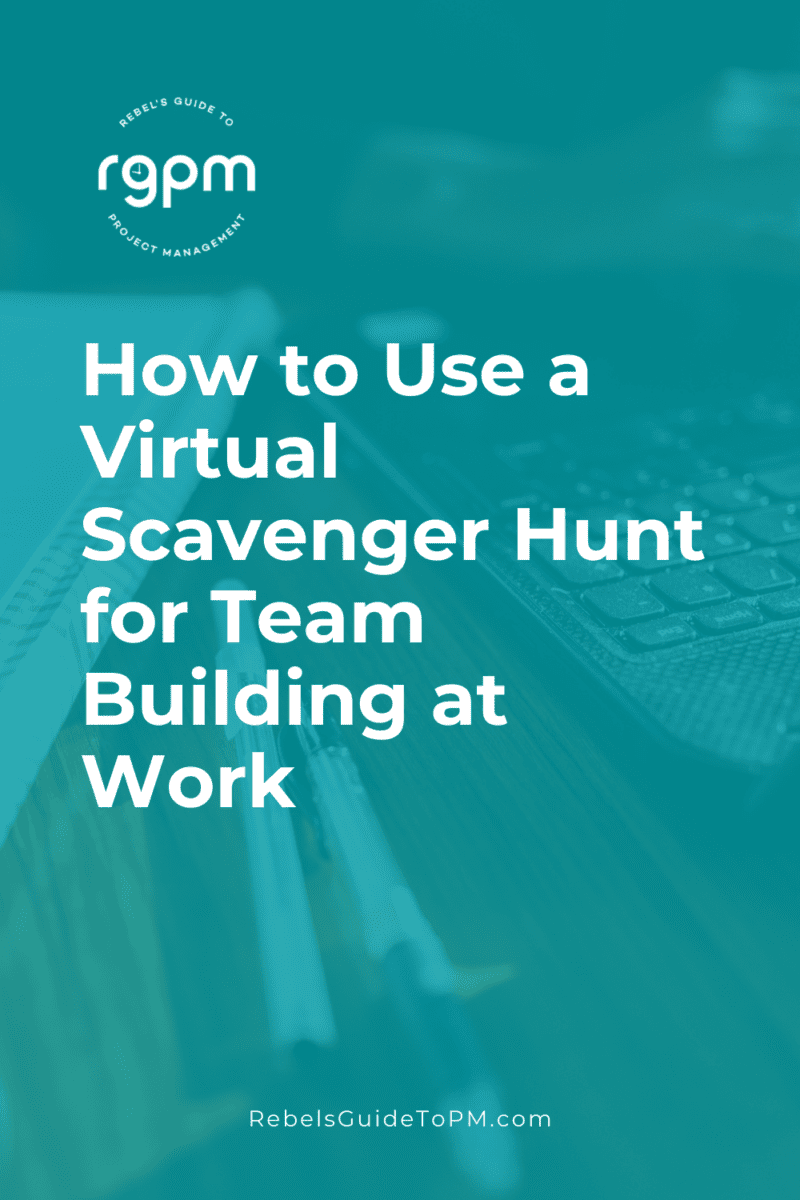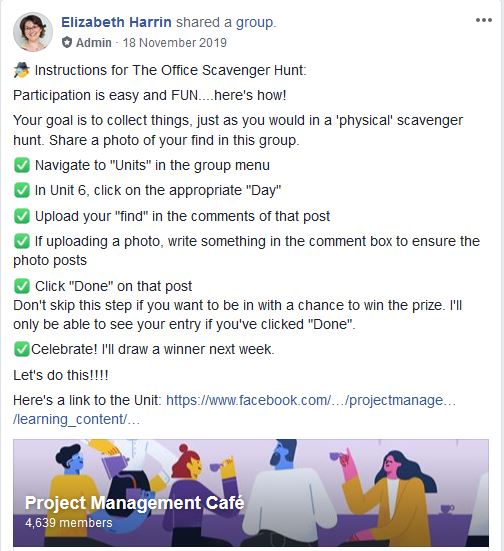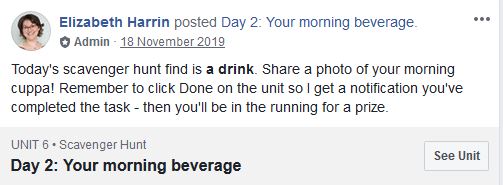How to Use a Virtual Scavenger Hunt for Team Building at Work
One of the questions I get asked most regularly about virtual teams is: “How can I build fun, trust and confidence in a virtual team if we’ve never met each other?”
In this article, I’ll share an easy
We’re talking about a virtual scavenger hunt
What is a scavenger hunt?
A scavenger hunt is where you have a list of items and you have to find them, often within a time limit to make it a game or competition between individuals or teams.
Sometimes the items on the list might be activities to do. For example, at the Tribe conference I attended in 2019, the scavenger hunt took place around Toronto and included things to do like taking photos of each other doing certain actions e.g. riding a bike.

This particular scavenger hunt was constructed as a
Teams had to find different local monuments and take photos of themselves in certain locations or doing particular things.
That’s cool if you’ve got an outgoing group of people who can physically all be in the same space. But that isn’t the case for many work teams today.
So we’re not doing anything that is going to involve leaving your desk.
How can I use a virtual scavenger hunt at work?
A virtual scavenger hunt is a way of building trust in virtual teams, and doing something fun at the same time.
In a virtual team, you can run this as a WFH treasure hunt. A scavenger hunt is a way of finding and sharing things with the group, for fun. You set a list of items and have team members find them locally to them. Then they share a photo of the item.
You can share images via email, a Slack channel, Facebook for business, or whatever chat app you use.
The picture below shows how I introduced the Office Scavenger Hunt in our Facebook group. Instead of doing it with my work team straight away, I did a trial run within the group so I could check out how it worked and also because people in our Facebook group are a fun bunch and I knew they would dive in to test the concept with me!
How to run a virtual team scavenger hunt
Here’s how to run a virtual team scavenger hunt yourself:
- Step 1: Decide on the theme and length
- Step 2: Write your clues
- Step 3: Decide how they will take part
- Step 4: Share the clues
- Step 5: Collate the responses and celebrate.
Let’s talk through each of those steps so you can see in detail how to get this working for your team.
Step 1: Decide on the theme and length
Decide on the theme for your scavenger hunt and how long it will run for.
There are some example scavenger hunt ideas and themes later in the article. You could choose something specific to your team, location or tie it in with a holiday or event, for example.
Then decide how long to do the scavenger hunt for. I typically use a week, because that’s one clue per work day. That’s enough. Any longer and it becomes a tedious chore to join in, and you definitely don’t want that.
Step 2: Write your clues
Make a list of things for your team to find on their scavenger hunt. You can either give them the whole list at once, or spread out the items over several days. Five items is enough – that’s one per day if you are using the week as your time-box for the activity.
Here’s a list of very basic things to find that everyone would be able to share photos of:
- Your desk
- The view from your window/office door
- Your lunch/breakfast
- You mug/drink of choice
- A selfie
- Your chair/what you sit or stand on to work
- Your favorite office stationery or pen
- Your computer (bonus points if the screen shows something relevant to your work, but obviously make sure there is nothing confidential on there).
Many people have pets that end up ‘sharing’ the office, so if your team members have pets, you could include that too.
If you don’t want to do a ‘finding’ scavenger hunt, you could opt for quiz questions each day instead.
Step 3: Decide how they will take part
How are you going to get the clues to the participants? I used Facebook because I wasn’t doing it with my real work team, but you could use Slack, email, your collaboration tools or anything else that your group is used to using.
Make sure everyone has access to whatever medium you are going to use. It’s easier if you can schedule the clues to go out on a timed basis, such as writing your emails in advance and then delaying the send until the correct day. That saves you the overhead of remembering to send the clues every day.
Decide if you are going to award points and have a winner, and what you will do if there is a draw. I wouldn’t bother with a winner next time I did this in a work team. It’s the participation that helps build trust and gives the team something to talk about. But you can offer a prize if you like.
Step 4: Share the clues
Send the first message to your team with instructions on what to find and how to share their find. Ask your virtual (or local) team to find certain objects, complete a quiz question each day, share photos, do an activity or whatever.
Repeat until the end of the scavenger hunt.
Step 5: Collate responses and celebrate
Each day (or at a time period you decide on), they report back to you and/or the rest of the group with what they found.
At the end of the week, the person with the highest score, or a winner drawn at random, gets the honor and glory.
As I said above, you don’t have to give them a prize. But it might be nice. When I ran a scavenger hunt in our Facebook group, I offered people the chance to win a copy of my Essential Project Documents bundle.
A scavenger hunt is a free way of creating a shared experience for a virtual team.
Do scavenger hunts work for team building ?
I think so! I tested out the idea in our Facebook group and we had a great time!
We did it for fun (because we’re obviously not a work team), because our Facebook gang is awesome and we like to try different things! But also because a scavenger hunt is a very simple team activity you can do yourself with your project team.
People shared photos of their desk, their favorite drink, their favorite (or currently reading) project management book and other things, across 5 days.
Here’s an image of the Day 2 announcement in Facebook so you can see the type of language to use to get your team engaged.
We had a lot of people participate and in the end I drew 3 winners at random.
My tip would be do not make the scavenger hunt compulsory. I have done some research into gamification in project management for my latest book and forcing people to take part in things like this is not great for team morale. Some people aren’t going to be motivated by this kind of activity, but for others, it’s a great way to build your team.
Scavenger hunt team building ideas
Our office scavenger hunt example above is based on things you can see from or in your office. You can replicate this with your colleagues, and it’s a good idea to have some purpose to it, rather than just randomly asking them to find objects.
Here are some themes for scavenger hunt
Holiday themed: Share photos of your home, office or local town celebrations related to the holidays e.g. for Christmas, one day would be a photo of a tree, one day would be a photo of mince pies etc.
Travel/location themed: For virtual teams, a good
Questions could be things like:
- Share a photo of a local tourist attraction
- Share a photo of a local delicacy
- Take a photo of someone wearing a typical item of clothing.
You’d want to give people enough time to do this though, so maybe run the challenge over a few weeks.
Video hunt: For a team prepared to get a bit creative and perhaps look a little bit funny in front of colleagues, you could ask them to share a video each day of them doing a task such as air guitar, drinking a glass of water etc.
Project themed: Think about your project and what kind of scavenger hunt it lends itself to. Could you run a challenge over the whole life of the project for the person who visits the most locations? Could you do a quiz question a day based on some specific project topic or knowledge? What about photos of items specifically relevant to your project?
You’ll need to get your thinking hat on, but you could do it.
Will you try a scavenger hunt at work as a way of building your virtual team?
Other Virtual Team Building Ideas
- Conference call bingo
- Create a map of team locations
- Have lunch together (on camera)
- Send small gifts to each other
- Listen to certain training and development podcasts or do professional development tasks each day (less “fun”, more structured career development, but could work depending on your goals)
- Create a team playlist
- Set up a countdown calendar marking the time to a significant event or sharing training/fun materials every day for a set time period.
Leading a virtual team? Listen to Elizabeth on a podcast sharing tips for effective remote leadership.
Pin for later reading:



